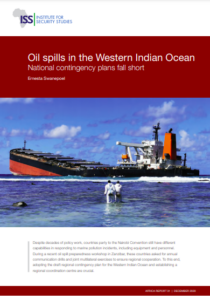Coordination is vital to ensure that African countries can assist one another during a marine pollution incident, as the grounding of MV Wakashio last July off Mauritius showed that the activation of a national oil spill contingency plan cannot stop the far-reaching impacts of marine pollution incidents.
These are the key findings of a report issued in December by The Insititute of Security Studies (ISS), as part of its Africa Report series which analyses human security problems and solutions at the regional and continental level.
Despite decades of policy work, countries party to the Nairobi Convention still have different capabilities in responding to marine pollution incidents, including equipment and personnel, the report finds.
[smlsubform prepend=”GET THE SAFETY4SEA IN YOUR INBOX!” showname=false emailtxt=”” emailholder=”Enter your email address” showsubmit=true submittxt=”Submit” jsthanks=false thankyou=”Thank you for subscribing to our mailing list”]
In 1994, the bulk carrier MV Apollo Sea sank off Cape Town, silling bunker fuel and contaminated beaches
and penguins. In 2000 the MV Treasure sank and spilled 200 tonnes of HFO, with devastating impacts on African penguins. In 2009 the Turkish bulk carrier Gulser Ana ran aground off Cap St Marie, southern Madagascar, resulting in an oil spill of 500 MT of HFO and 39 000 MT of rock phosphate cargo.
In the most resent case, the bulk carrier MV Wakashio ran aground off Mauritius early in the evening of 25 July 2020, attracting significant media attention for several weeks following the occurrence, as fuel oil started leaking from the vessel in the environmentally sensitive region and adverse weather conditions impeded proper response.
One of the lessons to be learned from the recent incident in Mauritius is that NOSCPs must be revised regularly and must provide for all eventualities.
While Mauritius was prepared and took swift preventative actions during the MV Wakashio incident, the country was ‘insufficiently equipped’ to handle the unprecedented environmental catastrophe that followed. The ‘resources and capacity’ of the NOSCP were overwhelmed and the country received assistance from France, India, Japan and the IMO.
The MV Wakashio incident raised questions as to whether countries’ contingency plans are sufficient, and what makes a country or region sufficiently equipped to respond to marine pollution incidents.
See also: Satellites make new revelations for Wakashio grounding
Key findings
- The July 2020 grounding of the MV Wakashio off the coast of Mauritius showed that the activation of a national oil spill contingency plan cannot stop the far-reaching impacts of marine pollution incidents.
- As signatories to international conventions, countries have a legal obligation to organise and prepare their response to major marine pollution incidents and to make efforts at national, subregional and regional levels in this regard.
- Significant policy work has been undertaken in the Western Indian Ocean region to collectively prepare a response to oil spills and other hazardous pollution incidents, but the draft regional contingency plan has not been adopted yet.
- During the most recent regional oil spill preparedness workshop in Tanzania, countries asked that the establishment of a regional centre or mechanism for the implementation of regional coordination be finalised as a matter of urgency.
- Countries also requested annual communication drills and joint multilateral exercises, as well as continuous capacity building. This is crucial to ensure standardised response capabilities.
- The establishment of a regional centre can contribute to a more coordinated and standardised response by way of regional coordinated training exercises on a regular basis.
Recommendations
- As the basis for regional cooperation in major marine pollution emergencies, the draft regional contingency plan (a result of the Agreement on the Regional Contingency Plan for Preparedness for and Response to Major Marine Pollution Incidents in the Western Indian Ocean Region) must be adopted. It has been in draft form for more than a decade.
- Nationally, operational personnel and various parties involved in marine pollution incidents must gain continuous training and experience in handling the relevant equipment and products. Training can take the form of seminars, workshops, tabletop exercises, drills, functional exercises and full-scale exercises.
- Regionally, annual training exercises and joint multilateral exercises must be held, either in the form of regular on-the-ground training or with simulator training.
- Funding sources from both national governments and international mechanisms must be identified and mobilised to support regional training and exercise programmes. When countries lack the necessary funding to participate in SEAIGNEP meetings, online meetings should be organised.
- The establishment of the Regional Coordination Centre must be finalised by the end of 2021 to coordinate regular and standardised training exercises.
- Strong political will is needed on a national level to ensure funding is available for operational personnel to attend the necessary meetings, workshops and training; to adopt the draft regional contingency plan; and to establish the regional coordination centre.
Explore more herebelow:































































